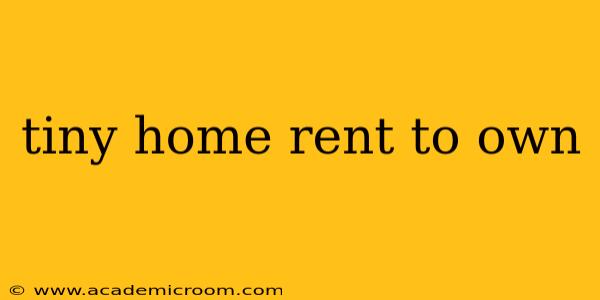The dream of homeownership is often out of reach for many, especially with rising housing costs. But what if there was a more accessible route? Rent-to-own (RTO) programs for tiny homes are emerging as a potentially viable alternative, offering a unique path to owning your own property. This guide will explore the benefits, drawbacks, and important considerations of tiny home rent-to-own options.
What is a Tiny Home Rent-to-Own Program?
A tiny home rent-to-own program works similarly to a traditional rent-to-own agreement for larger homes. You pay a monthly rent, with a portion of that rent applied towards the eventual purchase price of the tiny home. The agreement typically outlines a specific timeframe (e.g., 3-5 years) and purchase price. Crucially, unlike a lease, a portion of your monthly payments goes directly toward owning the property, not just covering rent.
Is a Tiny Home Rent-to-Own Agreement Right for Me?
This depends heavily on your individual circumstances and financial goals. Consider these points:
- Financial Stability: You need a consistent income to make the monthly payments. A strong credit score isn't always required, but a history of responsible financial management is beneficial.
- Savings: While rent-to-own programs reduce the upfront cost of a down payment, you'll still likely need savings for closing costs and potential repairs.
- Lifestyle Suitability: Tiny home living isn't for everyone. Are you prepared for a more minimalist lifestyle and potentially smaller living space?
- Legal Protections: Carefully review the contract. Understand all the terms, including the purchase price, payment schedule, and conditions for default.
What are the Benefits of a Tiny Home Rent-to-Own Program?
- Lower Upfront Costs: Compared to buying a traditional home, a tiny home RTO program often requires significantly less money upfront. This makes homeownership more accessible to those with limited savings.
- Building Equity: A portion of your monthly payment goes towards building equity in the tiny home, increasing your ownership stake over time.
- Easier Qualification: The qualification process might be less stringent than traditional home loans, making it a more achievable option for those with less-than-perfect credit histories.
- Affordability: Tiny homes are generally much cheaper to purchase and maintain than larger homes, resulting in lower monthly payments.
What are the Drawbacks of a Tiny Home Rent-to-Own Program?
- Higher Overall Cost: While upfront costs are lower, the overall cost of purchasing the tiny home through a rent-to-own agreement can sometimes exceed the market value, especially if you don't complete the purchase term.
- Risk of Default: Failure to make timely payments could result in losing your investment and the tiny home.
- Limited Flexibility: Rent-to-own agreements are usually legally binding and less flexible than a standard rental agreement.
- Finding Reputable Sellers: Not all rent-to-own programs are created equal. It's crucial to find a reputable seller to avoid scams or unfair contract terms.
How Much Does a Tiny Home Rent-to-Own Program Cost?
The cost varies significantly depending on the size, location, features, and terms of the agreement. Monthly payments can range from a few hundred to over a thousand dollars, depending on the specific program. Research thoroughly and obtain multiple quotes before committing.
Where Can I Find a Tiny Home Rent-to-Own Program?
Finding rent-to-own tiny homes requires research. Online marketplaces, local real estate agents specializing in alternative housing, and direct connections with tiny home builders could be useful starting points. Always thoroughly vet potential sellers and agreements before proceeding.
What are the Legal Aspects of Tiny Home Rent-to-Own?
It's essential to have a lawyer review the contract before signing. Pay close attention to clauses concerning: payment schedules, property taxes, insurance, repairs, default conditions, and the purchase price. A clear and legally sound contract protects both parties involved.
This information is for educational purposes only and should not be considered legal or financial advice. Always consult with professionals for personalized guidance before entering into any rent-to-own agreement.
